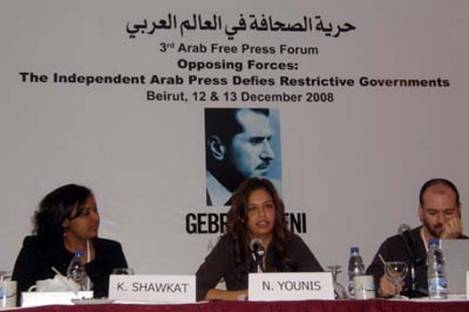
From left: Sudanese blogger Kizzie Shawat, Egyptian blogger Nora Younis, Tunisian blogger Sami Ben Gharbia (Source: The Huffington Post)
When Tunisian bloggers suspected that the presidential jet was being frequently used for personal business by friends and family of the president, they used airport records to track its travels and compared it to official government records. Only one of ten trips proved to be official. Using Google maps, the bloggers illustrated their findings by “following” the plane in a video that was posted on YouTube and could be viewed within Tunisia. This and many other testimonies of how bloggers distribute information in the Arab world were shared at the 3rd Arab Free Press Forum, taking place on 12 and 13 December in Beirut, Lebanon.
The second session of the Forum focused on the changing face of Arab blogging. The three presenters are all living and writing from outside their countries.
Summaries of the presentations:
Mohammad Al-Abdallah, Blogger, I’m Leaving and I’m Not Coming Back
Syria has imposed draconian restrictions on internet usage, requiring users to provide detailed identification and requiring internet cafes to keep records on the habits and site visits of all their users – and it blocks YouTube, Facebook, Wikipedia, Skype and other international sites.
Despite these restrictions, internet usage in Syria – introduced only in 2000 — is growing, and is expected to reach 10 percent of the population by 2009.
The number of Syrian bloggers is also growing, and they provide a vital service to the country, says Mr Al-Abdallah, who provided an evolution of the internet in Syria.
“We have become a source of information for Syrian citizens, despite all the constraints and obstacles for even just being on the internet,” says Mr Al-Abdallah, who left Syria after being arrested twice and facing a third arrest (his father and brother and both in jail). “A small number of citizens are trying to circumvent the embargo. This if of great importance in a country where the government doesn’t allow people to meet and get together.”
Kizzie Shawat, Blogger, I Have No Tribe, I’m Sudanese, Sudan
Kizzie Shawat is a pseudonym for a young college student who began blogging because “I had no venue to express my opinion.”
Ms Shawat, who writes about female genital mutilation and other controversial topics, sees her role as providing a view of her country from a different perspective from official sources.
Though censorship is strict in Sudan, the authorities have not been successful in blocking all opposition websites, says Ms Shawat, creating an opportunity for bloggers like herself.
But she has another audience as well – the vast Sudanese diaspora – among whom she tries to encourage unity in a divided country. “Our national identity is important and I try to emphasize this in my blog,” she says.
“It is an important forum for social activism,” she says. “You have to allow people to express themselves and we’re not used to doing that.”
Sami Ben Gharbia, Blogger, Fikra, and Global Voices Advocacy Director, Tunisia
Tunisia has what may be the world’s most sophisticated internet blocking apparatus – it not only block websites, it pirates them and adds false and misleading information. But that doesn’t stop Tunisian bloggers for finding and using innovative ways around the system, and providing compelling multimedia reports to provide a counterpoint to official propaganda.
When official media “reported” that the Italian region of Tuscany had named a major highway after Tunisian Zine El Abidine Ben Ali, bloggers photographed the new street, showing it was an insignificant rural road leading to nowhere.
Suspecting that the presidential jet was being frequently used for personal business by friends and family of the president, bloggers used airport records to track its travels and compared it to official government records. Only one of ten trips proved to be official. Using Google maps, the bloggers illustrated their findings by “following” the plane in a video that was posted on YouTube and could be viewed within Tunisia.
Bloggers have also found interesting ways of beating the censors, such as buying Google Ads keywords so their information pops up whenever someone searches for certain words.
Mr Gharbia’s presentation focused on the methods Tunisian authorities use to block independent information – including “deep inspection” of e-mails – and how freedom of expression advocates try to get around them.
Source: Arab Press Network




[…] […]